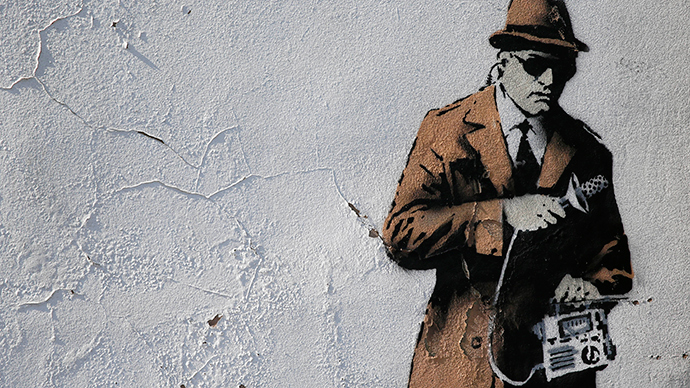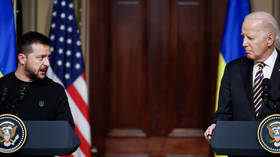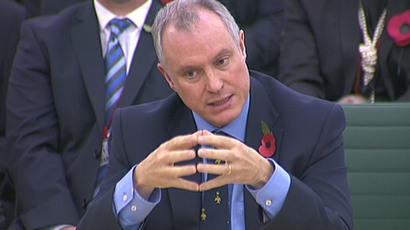Legal privilege? MI5, MI6, GCHQ snoop on lawyers’ client comms

The UK intelligence services have intercepted legally privileged communications between clients and their lawyers in high profile security cases, released passages of internal policy documents revealed.
“The Government has been forced to release secret policies which show that GCHQ [the Government Communications Headquarters] and MI5 [the Security Service] have for years advised staff that they may 'target the communications of lawyers,' and use legally privileged material 'just like any other item of intelligence,” Reprieve human rights group said in a statement.
The disclosure of previously classified material comes in response to the torture case of two Libyan families whose members have been tortured by Colonel Gaddaffi regime, in a joint CIA-MI6 operation.
Abdel Hakim Belhaj and Sami al-Saadi, exiled from Libya, were kidnapped in Southeast Asia in 2004 and sent by British and US Intelligence agencies to Libya. There, both men claim to have been tortured at the hands of the regime.
READ MORE:Libyan torture victim wins right to sue British government in open court
“It's now clear the intelligence agencies have been eavesdropping on lawyer-client conversations for years. Today's question is not whether, but how much, they have rigged the game in their favour in the ongoing court case over torture,” Cori Crider, director at Reprieve, said in the statement.
Al Saadi and Belhadj families, assisted by legal charity Reprieve and solicitors Leigh Day have brought the case Investigatory Powers Tribunal (IPT), a judicial body, independent of the British government, which hears complaints about surveillance by public bodies.
The defense alleged that by intercepting privileged communications between their clients and Reprieve and Leigh Day, the UK agencies infringed their right to a fair trial.
They argued that such practice violates the confidentiality privilege and is illegal under British law. The suit stated that MI5, the Secret Intelligence Service (MI6) and the GCHQ, intercepted their client's communications with their lawyers, depriving them of a fair trial.
READ MORE:Tortured Libyans allege UK spied on legal talks
The extracts of secret policies from the three intelligence agencies have disclosed to human rights groups despite the government's reluctance to so, arguing that the release of such information would compromise national security.
“After many months’ resistance, the security services have now been forced to disclose the policies which they claim are in place to protect the confidential communications between lawyers and their clients.
“We can see why they were so reluctant to disclose them. They highlight how the security services instruct their staff to flout these important principles in a cavalier way. We hope the Tribunal will tell the government in no uncertain terms that this conduct is completely unacceptable,” Richard Stein, Partner at Leigh Day, said.
The 28 re-typed “exhibits”, attached underneath the government’s legal response, show guidelines in force at various times on how intelligence officers might use such sensitive material.
On Thursday, the tribunal heard the statements from the defense team. Dinah Rose QC, for Belhaj, told the tribunal that documents reveal that UK intelligence hid from the courts that they held legally privileged material relating to security cases.
“There’s a real risk, if these matters are not fully explored, that confidence in our justice system could be undermined,” she told the tribunal, as quoted by the Guardian.
“These policies raise a strong prima facie case that there’s been abuse of process and that real injustices may have been done. Even the most recent policies do not adequately provide for proper information barriers [between] those handling litigation and those who received the intercepted legally privileged material.”

Former Shadow Home Secretary MP David Davis, who observed the tribunal, said that lawyer client confidentiality is a “foundation stone of our legal system,” calling the revelations in the tribunal a “national scandal.”
“In the past, when a bug or intercept on a criminal accidentally picked up a conversation with the criminal’s lawyer, the rule was that it was immediately deleted. Today’s hearing shows that is no longer the case,” he added.
According to the defense, MI5, MI6, and the GCHQ have their own procedures in relations to lawyer-client material.
GCHQ, for example, advises its personnel that “you may in principle target the communications of lawyers.” MI5 states that “In principle, and subject to the normal requirements of necessity and proportionality, LPP material may be used just like any other item of intelligence.”
In at least one instance privileged information has been inappropriately passed to lawyers involved in litigation against the agencies where, in the government’s words, “the potential for “tainting” was identified”. (Government Response to RFI at para. 28).
“No full checks have yet been carried out, so this incident may well be one of many,” Reprive said in a briefing document.
At the Tribunal, Rose said, “This [Belhaj] case is the tip of the iceberg. It raises questions about a large number of cases and about the integrity of judgments reached by courts in civil and criminal cases. We have a situation where the policies, on the face of it, appear to permit lawyers to be involved in practices that are unlawful and unethical.”
“The documents clearly show that MI5’s and GCHQ’s policies on snooping on lawyers have major loopholes. And MI6’s ‘policies’ are so hopeless they appear to have been jotted down on the back of a beer mat. This raises troubling implications for the whole British justice system. In how many cases has the Government eavesdropped to give itself an unfair advantage in court?” Cori Crider says.
Meanwhile UK's Law Society called for changes to the laws governing telecommunications interception.
“The absence of explicit protection for legal professional privilege in the Regulation of Investigatory Powers Act 2000 (RIPA) has been of long-standing concern to the Law Society and we have raised our concerns with the Home Office.
“The documents released in this case before the IPT illustrate the inadequacy of the existing legislative framework. We hope they will be fully taken into account by the Independent Reviewer of Terrorism Legislation in considering the case for amending or replacing RIPA.”














